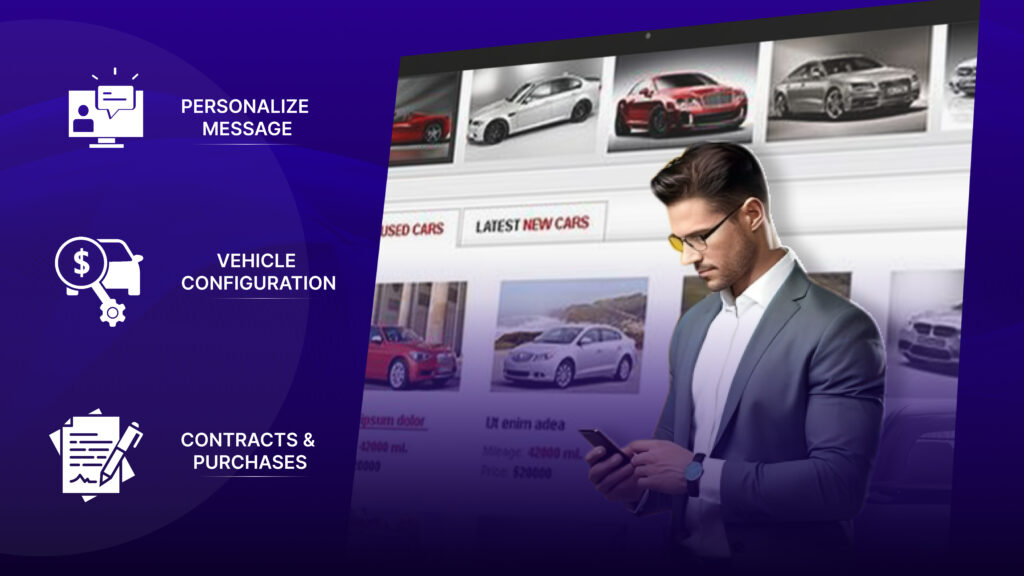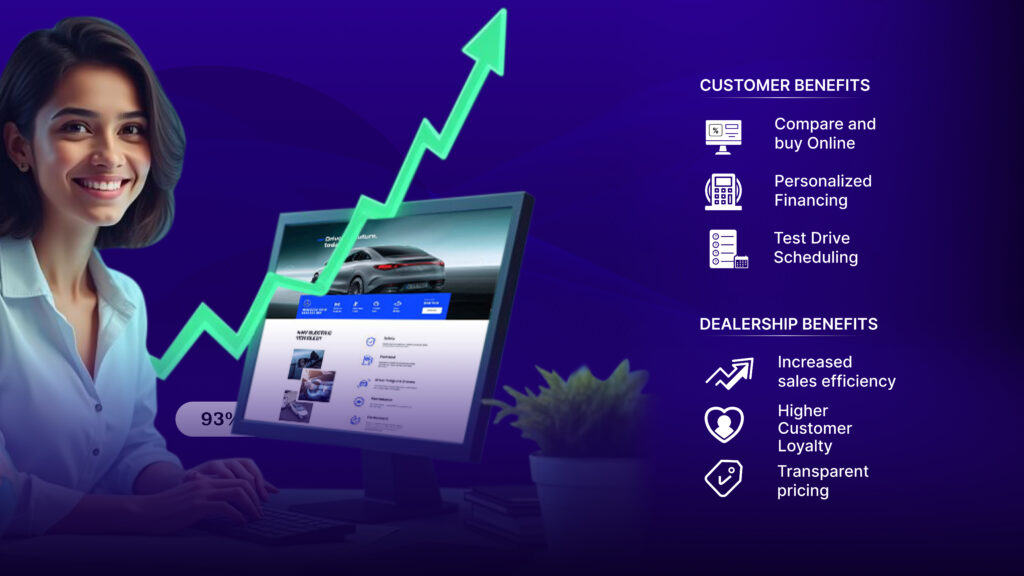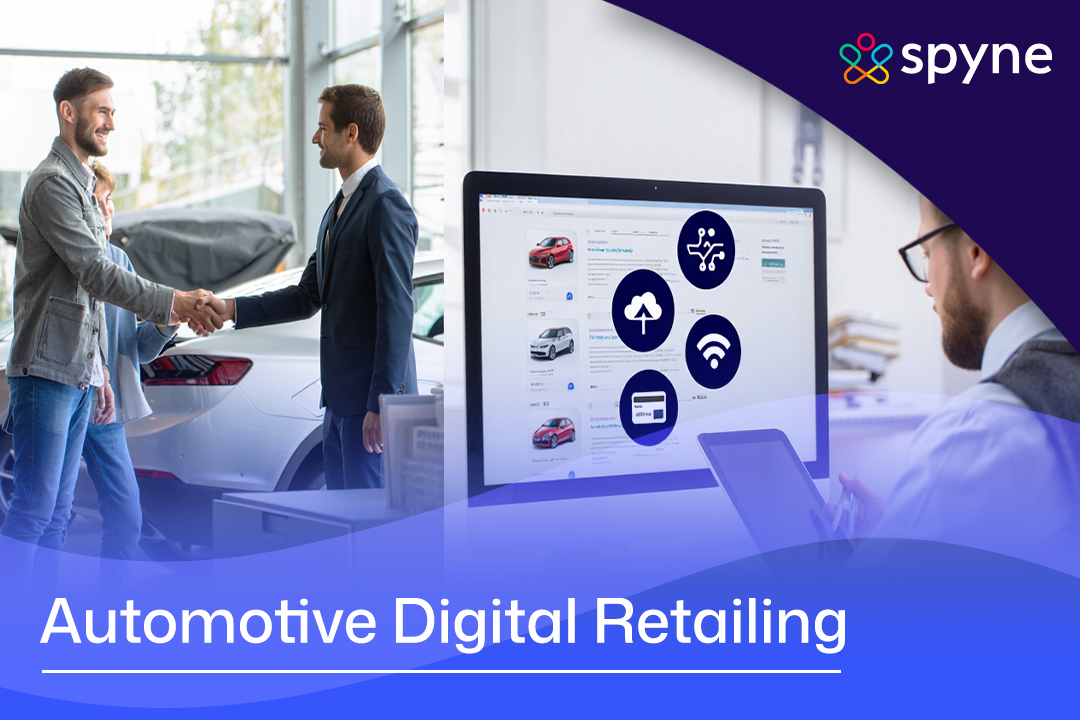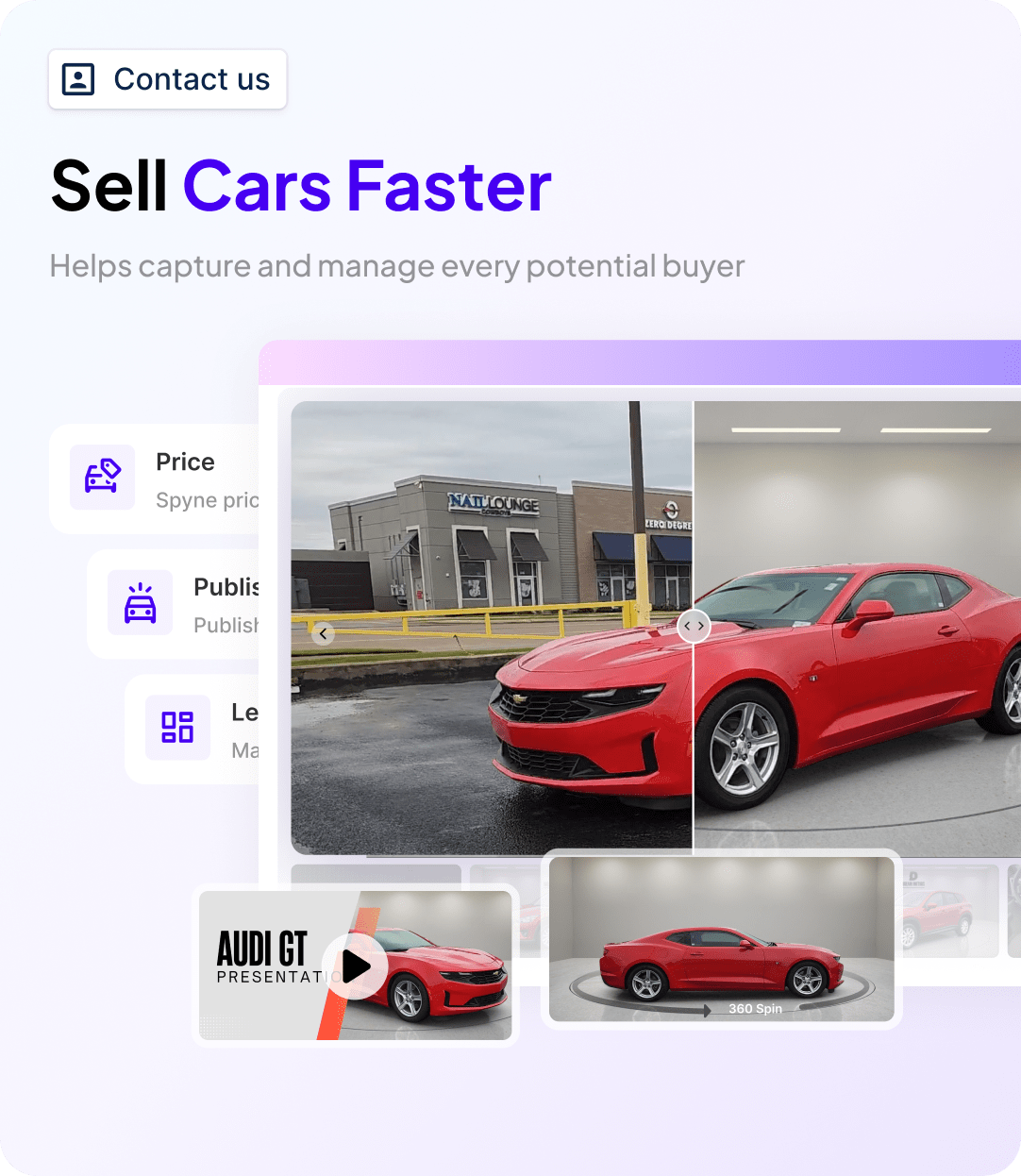Automotive Digital Retailing is the transition from on-premises traditional car buying to virtual spaces that simplify the entire buying process, be it browsing to end purchase. Facilitated by technologies such as AI-based recommendations, e-contracts, and virtual showrooms, it enables customers to purchase at their convenience with maximum transparency and personalization. Dealerships get to enjoy more customer engagement, better inventory insights, and reduced costs. Key drivers such as seamless integrations, real-time support, analytics, and omnichannel strategies make it an effortless implementation. Although it provides unparalleled convenience and efficiency, challenges such as security, infrastructure expenses, and few test drives are present. But with the right implementation strategies, automotive digital retailing is transforming the car sales model for both buyers and sellers.
What is Automotive Digital Retailing in 2025?
Automotive digital retailing involves buying and selling vehicles online using high-tech to simplify the car-buying experience. It allows customers to complete most phases of the car-buying process at home, from browsing and configuring to purchasing vehicles online. With tools like AI-based recommendations, virtual showrooms, and bundled finance and trade-in, automotive digital retail simplifies the entire process for buyers and sellers alike.
This shift from traditional, face-to-face purchasing to digital media provides consumers with the means to do everything from researching vehicles to finalizing the sale online, while offering dealers new means of reaching more individuals. Digital automotive retailing has been driven by increasing demand for online shopping, particularly since the pandemic. Dealerships that have adopted these technologies are seeing improved conversion rates, higher customer engagement, and higher sales.
How Digital Retailing Functions in Automotive and Top Elements for Successful Execution
These tips can serve to direct the description of automotive digital retailing based on convenience, transparency, and tech-based factors that render it so successful.
How Digital Retailing Functions:
Research: Consumers browse websites and search for the vehicle of their choice. They compare the price, specification, and market value of the brand.
- Personalized message: Most car websites suggest products according to customer choice, price range, and location. They can surf through them and get all the desired products with a single click, which simplifies decision-making.
- Online Inventory and Browsing: Customers can browse dealership inventories at home with different filters such as make, model, price, and features.
- Vehicle Configuration: Platforms enable customers to configure their vehicles, choosing features and options that best suit their desires.
- Contracts and purchases: The customer has finally made up his mind after doing all the research. Contracts may be signed online, and various customers are provided with various financing opportunities.

Important Elements for Successful Digital Retailing:
- Personalized Experience: Personalizing the buying process according to the customer’s needs (e.g., vehicle or financing suggestions).
- Convenience: Providing 24/7 access to inventory, pricing, and financing, enabling customers to shop at their convenience.
- Transparency: Upfront and clear pricing information that builds trust.
- Streamlined Digital Tools: Utilization of virtual showrooms, online financing, and digital contracts to accelerate and simplify the process.
- Omnichannel Approach: Providing seamless integration between online and offline sales efforts, ensuring a consistent experience across all touchpoints.
- Successful Marketing: Leveraging automotive SEO services, social media, email marketing, and content marketing to obtain, engage, and retain customers.
Top Benefits of Automotive Digital Retailing for Dealers and Consumers
Auto digital retailing offers significant benefits to both dealers and consumers, enhancing convenience, sales, and customer experiences in today’s market.
Benefits for Dealers:
- More Sales and Customer Interaction– Car digital retailing enables the dealer to interact with more customers, with 24/7 access to view, configure, and buy cars. Targeted messaging enhances the interest of the customers, resulting in high conversion rates.
- Better Inventory Visibility– Dealers can list all their inventory online, with images and descriptions, enabling customers to view and select cars easily. This makes buying easier, hence faster.
- Streamlined Operations– Internet retailing simplifies various steps involved in the purchasing process, including financing, documentation, and customer support. It frees time for customers and dealers, thus making the entire operation more effective.
- Better Customer Insights and Data– Websites offer information regarding customer behavior and what they like. Dealers can use the information to enhance marketing, manage inventory levels, and make suggestions.
- Cost Effectiveness– Retailing electronically reduces the need for physical showrooms and personal meetings, hence reducing operational costs, thus enabling dealers to spend on other parts of their business.
Benefits for Consumers:
- Convenience and Flexibility– Customers can shop from home at any time, comparing prices, features, and models without having to travel between dealerships.
- Transparency and Trust– Transparent prices with no surprises on online websites enable consumers to make informed decisions and build confidence in the process.
- Personalized Experience– Shoppers can personalize their car choices and compare finance terms to specs, making it easy and satisfying.
- Time-Saving– Internet-based services like virtual test drives, car comparisons, and quick finance applications save time.
- No geographical constraints– The customer can browse the inventories of dealerships nationwide, bypassing geographical limitations and expanding their options.
How to Choose the Right Automotive Retailing Platform for Your Dealership
Choosing the right platform for dealer digital retailing is very important for your dealership because it determines your results, how healthy processes are being performed, what end output you get, etc. Let’s look at some parameters for them-
- Boosts Customer Engagement: It enhances customer outreach and interaction, facilitating more accessible communication and further follow-ups.
- Seamless Integration: Automotive Retailing requires seamless integration with other platforms like DMS and CRM, and compatibility with third-party tools for smooth processes.
- Data Analytics: Data analysis is essential for tracking every dealership’s smooth functioning and effectiveness. Therefore, a dashboard of data on sales and customer behavior with the help of set KPIs is essential.
- Quick Support: Clients and customers should be given 24/7 connectivity by a dedicated support team, and if the human workforce is not available, then at least through AI chatbots and other communication channels
- Customisations: An interface that is easy for customers and dealership staff and provides customization options for templates, workflows, and lead management.
Best Features to Look for in a Digital Retailing Platform
Considering that digital retailing for automotive dealership are in so much demand, there need to be some essential features they need to be equipped with, which dealerships generally need. Let’s have a look at a few of them:
- Scheduling Test drives for customers: This is needed because customers want to feel and check how the vehicle performs.
- Trade-in values: This means a system is in place to check the trade-in values, that is, the current worth of the car, so that the buyer can get a fair price.
- Cost Breakdown: To maintain transparency, a system should be in place that breaks down all the costs, such as taxes, other fees, and maintenance costs, and provides the potential buyer with an accurate estimate.
- Financing and Credit Options: Many times, buyers do not prefer to pay the whole amount upfront rather various other modes of financing, like installments. Therefore, there should be credit estimators that give customers reliable options to find vehicles that fit into their budget.
- Reviews and Ratings: Buyers need information about vehicles, especially their reviews and ratings, which not only allows them to make a wise decision but, if ratings are high, even compels them to buy it.
Top 10 Auto Digital Retailing Software in 2025
Discover the top 10 automotive digital retailing companies in 2025, helping dealerships by providing automotive software that streamlines operations, boosts sales, and enhances customer experiences.
1. Spyne
Spyne offers end-to-end automotive retailing solutions designed to help dealerships sell vehicles faster. Its platform enhances online vehicle discovery, improves automotive lead generation, and supports digital retail workflows, enabling dealerships to streamline operations and boost profitability.
2. CDK Global
CDK Global delivers integrated technology solutions for automotive retailers, including CRM, inventory, and digital retailing tools. Known for its robust DMS, CDK helps dealerships streamline operations, enhance customer experiences, and drive growth across sales, service, and parts departments.
3. Auto/Mate, Inc.
Auto/Mate provides user-friendly dealership management systems tailored to franchised auto retailers. With flexible modules and excellent customer service, it helps dealerships improve workflows, boost profitability, and simplify key operations like accounting, inventory, and service management.
4. DealerSocket, Inc.
DealerSocket offers an all-in-one software suite including CRM, inventory, digital retail, and marketing tools. Focused on boosting dealer performance, it empowers teams with data-driven insights and seamless integrations to increase sales and customer satisfaction.
5. Dealertrack DMS
Dealertrack DMS by Cox Automotive offers cloud-based dealership management software with real-time insights and flexible integrations. Designed for scalability, it supports multi-location dealerships with accounting, inventory, and compliance tools to drive operational efficiency and profitability.
6. VinSolutions Inc.
VinSolutions connects dealership systems through its powerful CRM platform, streamlining customer data, sales processes, and marketing efforts. With real-time visibility and automation, dealers can improve engagement, lead conversion, and overall customer lifecycle management.
7. AutoFi, Inc.
AutoFi enables seamless digital retailing with its e-commerce platform, connecting customers, lenders, and dealerships online. It empowers buyers to browse, finance, and purchase vehicles entirely digitally, enhancing convenience and accelerating deal closures.
8. DealerBuilt
DealerBuilt delivers customizable DMS solutions that adapt to individual dealership needs. With open integration, real-time data access, and strong customer support, it enables dealers to enhance performance, simplify operations, and create a better customer experience.
9. DealerCenter
DealerCenter is an all-in-one dealership management platform offering CRM, inventory, BHPH, digital retail, and more. Designed for independent dealers, it simplifies everyday tasks and provides advanced tools to increase efficiency, compliance, and profitability.
10. Carsforsale.com
Carsforsale.com combines vehicle listings, dealership websites, digital marketing, and retail tools into one affordable platform. It helps dealers maximize online visibility, attract qualified leads, and streamline the path from inventory listing to customer engagement.
Emerging Trends and Capabilities in the Automotive Digital Retailing Industry
The automotive retail industry is rapidly evolving with digital tools, shifting consumer preferences, and innovative technologies transforming the buying experience.
Automotive Retail Industry Trends
The automotive retail industry is changing fast, driven by new technology and changing customer needs. Here are some of the main trends:
- E-Commerce & Online Sales: More people are comfortable buying cars online. Dealerships are improving their websites to help customers browse, customize, and buy cars online.
- Electric Vehicles (EVs) & Sustainability: As more people look for eco-friendly cars, dealerships are offering more electric vehicles (EVs) and focusing on sustainability.
- Subscription & Mobility Services: Instead of owning cars, many consumers are turning to subscription models that let them use cars without long-term commitments.
- Personalization & Customization: Dealerships are offering more options to personalize cars and services based on customer preferences.
- Omni-Channel Retailing: Consumers want a smooth shopping experience across both online and physical stores, making omni-channel retailing more important.
Automotive Digital Retailing Capabilities
Digital retailing solutions are changing how dealerships work, offering customers more control over their buying journey. Key features include:
- Vehicle Catalogs & Online Browsing: Digital catalogs with detailed vehicle info and high-quality images make it easy for customers to explore cars.
- Shopping Cart & Comparison: Customers can save and compare cars online to help with decision-making.
- Test Drive Scheduling: Customers can schedule test drives at their convenience, making the process easier.
- Financing Tools: Online financing calculators help customers see their options and make smart choices.
- Transparency & Negotiation: Clear pricing, financing options, and live support build trust and speed up the buying process.
How Digital Retailing is Affecting Dealerships and Why They Should Implement It
Digital retailing is revolutionizing the car dealership with greater efficiency as well as a better customer experience. With digital technologies, customers are now able to shop around in vehicles, compare, schedule test drives, and close deals online. Additionally, Digital retailing has spared consumers considerable time, as well as dealership customers save 93% of their time and dealerships save 60% of time per transaction. Digital retailing also enables dealerships to deliver customized experiences, such as personalized financing and clear pricing, that increase customer satisfaction and loyalty. The result is a quicker, more efficient process that benefits buyers and sellers alike and fuels business growth.

How to Implement Digital Retailing in Your Dealership
By implementing these steps, dealerships can stay competitive, increase efficiency, and deliver a modern, customer-centric experience.
- Choose the Right Platform: Choose a platform that will seamlessly integrate with your systems.
- Sync Listings for Updates: Update online car listings correctly, descriptively, and attractively.
- Offer Online Financing: Offer financing calculators and credit apps to make the buying process easier.
- Make Test Drive Booking Easy: Make test drive booking easy online for convenience.
- Show Transparent Pricing: Show all the fees and taxes clearly to build trust.
- Personalize the Experience: Personalize recommendations and offers using customer information. Train Your Sales Team: Train your sales team to use automotive digital retailing tools to their maximum potential.
- Train Your Sales Team: Train your sales team to use digital tools to their maximum potential.
- Monitor and Optimize: Check your system’s performance from time to time and make required adjustments.
7 Key Limitations of Auto Digital Retailing
Though digital retailing in the automotive sector provides ease, efficiency, and transparency, it also has several challenges. They may impact the dealerships as well as the customers. The following are some of the key issues on which the dealers should look while adopting digital retailing platforms:
1. Website Costs
Creating and hosting a safe, easy-to-use automotive e-commerce website costs money. Dealers need to pay not only for a good site but also update themselves on trends in automotive digital marketing to get the right visitors to their site.
2. Infrastructure Expenses
Digital retailing eliminates the necessity of on-site visits, but customers still want a physical presence for test drives and post-sale services. Dealers must factor in the costs of maintaining showrooms, inventories, and service stations.
3. Security and Fraud Risk
Internet transactions are exposed to cyberattacks. Without robust security, dealerships stand to lose customer confidence and their reputation. Hackers can attack websites to redirect financial transactions, so investing in security is essential.
4. Legal Compliance
The dealers have to comply with numerous legal obligations, such as procuring a license, adhering to consumer protection legislation, and tax laws. Non-compliance can result in legal problems and fines.
5. Building Customer Trust
It is more difficult to gain customer trust in an online environment without direct human interaction. The dealers have to establish credibility using customer reviews and superb online customer care.
6. Complicated Buying Process
Car purchase can be daunting to some customers, particularly those who are not car-savvy. The online process seems complicated because more choices and decisions must be made.
7. Loss of Test Drive Opportunities
Test driving is essential for most buyers to determine how well a car performs. Online retailing eliminates the opportunity for customers to get into the car and drive it before purchase.
Enabling Consumers to Seamlessly Navigate Automotive Digital Retailing Systems
Car purchasing is also evolving rapidly with the growth in digital retailing. Today, customers can also purchase cars over the internet, making the entire process simpler and more convenient. Digital retailing platforms are tailored to provide the customer with an effortless experience from discovery to acquisition, all while staying at home.
Some of the most significant features of digital retailing include:
- Online Car Browsing and Choosing: Consumers can browse car inventories on the Internet, applying filters to identify specifically what they’re looking for. Virtual showrooms enable them to view cars in 360 degrees and detailed information without setting foot in the dealer’s lot.
- Car Configuration and Personalization: Consumers can personalize their vehicle by selecting the attributes they desire so that the vehicle meets their demands and tastes just right.
- Clear Pricing and Financial Options: Online car dealer website provide transparent pricing, including tax and fees. Buyers also have tools to comprehend financing options, as well as being pre-approved for a loan.
- Virtual Test Drive and Simulations: Augmented reality (AR) and virtual reality (VR) enable the buyer to go for a virtual test drive and test the features and performance of the car from home.
- Trade-ins and Appraisals: Online tools allow buyers to have an estimate of the trade-in value of their car, facilitating the decision whether or not to trade in their old car.
- Convenience and Flexibility: Digital retailing is convenient and flexible. Some platforms even offer home delivery, and buyers don’t have to visit a dealership at all.
How Spyne Can Help Its Dealers in Automotive Digital Retailing
Spyne is revolutionizing automotive digital retailing by offering cutting-edge AI-driven solutions and tools that simplify and enhance the car-buying experience for both customers and dealerships. These automotive digital retailing solutions allow dealerships to provide personalized, interactive experiences that maximize each stage of the online car-shopping process. Here’s how Spyne assists its partners:
1. AI-Powered Virtual Showrooms & Vehicle Configuration
Spyne’s AI-driven platform features automotive digital retailing solutions that enable dealerships to create interactive virtual showrooms where customers can explore vehicles in a 360-degree environment. The vehicle configuration features of the platform also enable customers to personalize their vehicles online, creating a personalized and engaging shopping experience.
2. Personalized Recommendations & Customer Engagement
Spyne’s recommendation engine, which is included in its auto digital retailing solutions, applies AI to track customer browsing and preference history. This personalized technique provides vehicle recommendations that increase engagement and conversion by presenting buyers with the models best suited to their requirements.
3. Seamless Financing, Trade-In, and Payment
Spyne’s platform streamlines the purchase process through online financing calculators, trade-in value estimators, and electronic contract signing. These digital retailing tools for autos allow customers to finalize their car purchase efficiently and conveniently at home, avoiding wasted time at the dealership.
4. Availability 24/7 & Omnichannel Harmony
Spyne’s car digital retailing platform makes it possible for dealerships to be accessible to customers 24/7, offering always-available inventory, pricing, and financing details. This omnichannel platform makes online and offline selling easier, with a seamless, unified experience across channels.
5. Website Construction for Digital Showrooms
Spyne enables dealerships to create quick, mobile-friendly websites that act as robust digital showrooms. These sites, driven by automotive digital retailing software, are optimized to load quickly, feature vehicle imagery, and take buyers smoothly from search to checkout.
6. Email & Social Media Marketing Integration
With dealership email marketing and social media marketing capabilities integrated, Spyne allows dealerships to conduct targeted campaigns, promote listings, and re-engage leads. These capabilities aid in lead nurturing across the auto digital retailing journey, keeping dealers top of mind and driving repeat visits.
7. Rich Analytics & Insights
Spyne’s online retailing platform offers rich analytics and customer behavior, sales trends, and inventory levels. Dealerships are able to utilize these automotive digital retailing analytics to make better decisions, optimizing marketing spend and stock management.
8. Simple Inventory Management
Spyne’s solution has an integrated automotive inventory management system that assists dealerships in real-time listing updates, pricing optimization, and inventory reduction. This keeps your auto digital retailing plan cost-effective and profitable.
9. CRM for Improved Lead Management
Spyne provides an integrated automotive CRM solution that assists dealers in handling leads, monitoring conversations, and customizing follow-ups. The CRM integrates perfectly with other automotive digital retailing solutions, enhancing the overall customer experience and increasing sales team productivity.
10. Chatbots and Callbots for Instant Engagement
Spyne’s callbots and chatbots assist dealerships in remaining connected with customers throughout the buying process. These AI-based tools offer real-time support, respond to queries in real time, and walk potential customers through the site or over the phone, so that customers never get a feeling of being ignored. With instant automated responses, callbots and chatbots are a part of Spyne’s automotive digital retailing platform, maximizing lead conversion and offering smooth customer service.
11. Scalable, Secure, and Efficient
From workflow automation to protecting online transactions, Spyne provides secure, scalable solutions that expand with your dealership. These digital retailing solutions for cars are designed for today’s dealers who demand efficiency, flexibility, and trust.
Conclusion
Car buyers today don’t just walk into showrooms; they start their journey online. From browsing vehicles to securing financing, they expect a seamless digital path. That’s where automotive digital retailing shines. It empowers dealerships to meet customers where they are on their screens. But to truly win in 2025, you need more than just a website. You need smarter tools, sharper visuals, and connected systems. That’s where Spyne steps in. With AI-powered imagery, digital showrooms, and CRM integration, we help you create experiences that convert. Ready to transform your dealership into a digital powerhouse? Let Spyne lead the way. Book a free demo with Spyne now!







